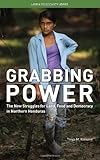Grabbing power : the new struggles for land, food and democracy in northern Honduras / by Tanya M. Kerssen.
Material type: TextLanguage: English Series: Land sovereignty seriesPublication details: Oakland, CA : Food First Books, 2013.Edition: 1st edDescription: p. cmISBN:
TextLanguage: English Series: Land sovereignty seriesPublication details: Oakland, CA : Food First Books, 2013.Edition: 1st edDescription: p. cmISBN: - 9780935028430
- 9780935028447 (ebook)
- Peasants -- Political activity -- Honduras -- Aguán River Valley
- Agriculture -- Economic aspects -- Honduras -- Aguán River Valley
- Land use, Rural -- Honduras -- Aguán River Valley
- Aguán River Valley (Honduras) -- Rural conditions
- Aguán River Valley (Honduras) -- Economic conditions
- Campesinos -- Actividad política -- Historia -- Honduras
- Agricultura -- Aspectos económicos -- Honduras
- 338.1097283/1
- HD 1531 K41g 2013
| Item type | Current library | Home library | Collection | Shelving location | Call number | Vol info | Copy number | Status | Barcode | |
|---|---|---|---|---|---|---|---|---|---|---|
 Libro
Libro
|
Biblioteca Juan Bosch | Biblioteca Juan Bosch | Ciencias Sociales | Ciencias Sociales (3er. Piso) | HD 1531 K41g 2013 (Browse shelf(Opens below)) | 1 | 1 | Available | 00000121510 |
Includes bibliographical references and index.
Pt. 1. From bananas to palm oil -- The Aguan Valley: land for the people -- The decline of agriculture and the rise of the maquila -- Grabbing land and power: the new agro-oligarchs -- Militarization and the war on drugs: security for whom? -- The war on peasants -- Pt. 2. Palm oil and the corporate food regime -- The making of a "food like substance" -- Subsidizing corporate expansion -- Free trade and fast food -- Greening the regime, part 1: fueling the "green" economy -- Greening the regime, part 2: ecotourism or eco-colonialism? -- Pt. 3. The new Aguan movements: land, resistance and food sovereignty -- The new cycle of struggle: a sketch of two Aguan movements -- Fighting fragmentation, constructing unity -- Peasant-controlled palm oil: the case of Salam? -- From palm oil to food sovereignty -- Conclusion: grabbing power back.
Grabbing Power explores the history of agribusiness and land conflicts in Northern Honduras focusing on the Agu n Valley, where peasant movements battle large palm oil producers for the right to land. In the wake of a military coup that overthrew Honduran president Manuel Zelaya in June 2009, rural communities in the Agu n have been brutally repressed, with over 60 people killed in just over two years. United States military aid--spent in the name of the War on Drugs--fuels the Honduran government's ability to repress its people. A strong and inspiring movement for land, food and democracy has grown over the last two years, and it shows no sign of backing down.
There are no comments on this title.

